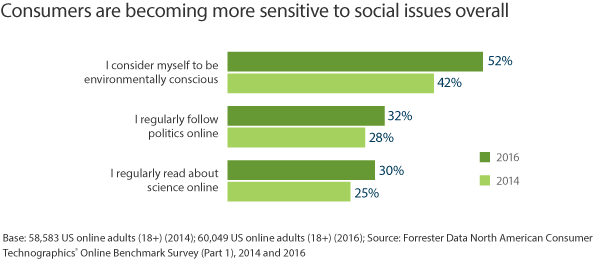The Data Digest: The Values-Based Consumer
If Thursday morning’s controversial tweet from McDonald’s is any indication, brands are no longer safe. I’m not just talking about the threat of a data breach or hack — I’m talking about the threat of consumers who force brands to expose their ethics and beliefs or remain at the mercy of consumer perception and interpretation in a polarized environment. As we’ve seen with other examples of ubiquitous and once universally loved brands like Kellogg’s and L.L. Bean, consumers increasingly judge companies on the basis of their values — and while customers are skeptical of firms that stay silent, they open their wallets for those that champion appealing causes.
Forrester’s Consumer Technographics® data reveals that this is hardly a passing cloud; customers are becoming more aware of — and sensitive to — social issues overall. For instance, more consumers regularly follow politics, read about science, and identify as being environmentally conscious today than in 2014:

Consumers’ growing demand for transparency around company values is not only about politics. Rather than expecting companies to take a political stand, customers expect them to declare and act on their corporate values whatever they may be — whether related to manufacturing practices, employment conditions, privacy regulations, or environmental commitments. Today’s increasingly empowered consumers, enabled by an attitude of experimentation, sophisticated devices, and infinite connection, have the resources and motivation to learn how companies execute on the values they claim to embody. More than a tagline, customers now believe that company values are reflected in everything a firm does or says — from its hiring practices to strategic partnerships to advertising tone.
So, the race is on for marketing leaders to get smart about when, where, and how to win consumers’ hearts and business through an appeal to values. This requires marketers to develop a deep understanding of consumers’ emotional and psychological needs. As my colleague Dipanjan Chatterjee says in his recent report, “Brands do not just satisfy our material needs; they also speak to our subconscious. The best ones connect to us emotionally in ways that help secure them an unassailable position.” In today’s particularly heated environment, appealing to consumers’ ethics and beliefs can be a minefield. To resonate effectively, marketers must first ask themselves: How can we explain this change in consumer attitude and behavior, what are customers really after, and why?
These are the questions I’ll be exploring in a keynote speech at Forrester’s Consumer Marketing Forum in New York City on April 6 and in my forthcoming report that will be unveiled at the event. I look forward to seeing you there!
